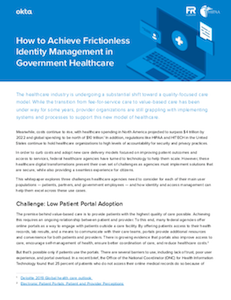- Sponsored
- Modernization
Improve data security and interoperability for public health agencies

The healthcare industry continues to look for better ways to share information to improve the quality of patient care. However, implementing patient portal systems — and the processes behind them — presents several technical challenges when information needs to pass across different organizations, including health agencies in government.

Read the full report.
“Health care agencies need to consider [the use cases] for each of their main user populations — patients, partners, and government employees — and how identity and access management can help them excel,” say experts in a recent whitepaper from Okta.
The whitepaper explores some of the principal challenges surrounding data security and user access and how a modern identity and access solution can help public health organizations improve interoperability of patient and health data.
Low patient portal adoption
Value-based care is a model that seeks to provide patients with the highest quality of care possible. That advent of portals was intended to help improve the ongoing relationship between patient and provider.
The report, however, indicates a number of barriers are slowing the adoption of portals, including lack of trust, poor user experience and portal overload. The report cites a brief from the Office of the National Coordinator (ONC) for Health Information Technology that “found that 25% of patients who do not access their online medical records do so because of security or privacy concerns.”
But modern identity and access management tools, which incorporate automation and API capabilities, can improve the experiences of health partners and patients and close security gaps without burdening the IT department.
“Automation can authenticate any individual needing to access records, ensuring that person is who he says he is, and then authorize which specific information can be accessed and how it may be used,” says the report.
Identity as the foundation for patient portal engagement
Earning user trust in portals requires striking the right balance between robust security and positive user experience, according to the report.
“A single sign-on (SSO) process removes friction by allowing patients to use one set of credentials to securely access all their health-related resources,” the report says.
“Choosing an identity solution with customizable, out-of-the-box functionality can help healthcare organizations create a modern onboarding experience without extensive time or resources from their IT team. An identity provider who is able to unify web, mobile and omni-channel experiences will also further decrease friction and enhance the user experience for patients.”
Interoperability of care when multiple organizations are involved
With organizations all using their own portal system, overcoming the challenge to provide access to information, while ensuring security and data privacy, has proven particularly difficult.
A modern identity and access management system, like Okta’s platform, uses an interoperable healthcare API standard called SMART on FHIR (Fast Healthcare Interoperability Resources) to enable different applications to access health records in a secure way.
“A cancer patient’s primary care physician would need access to the information maintained by the NCI on the clinical trial, for example, and would probably also want to be able to upload routine patient information such as blood work,” the report notes.
The report goes on to explain how Okta’s platform is designed to be the foundation for a modern zero-trust security architecture — a necessity for the healthcare industry — and how it further helps customers maintain and prove adherence to healthcare security regulations like HIPAA and EPCS.
Learn more about how a modern identity and access solution can help public health organizations modernize patient care.
This article was produced by FedScoop for, and sponsored by, Okta.






